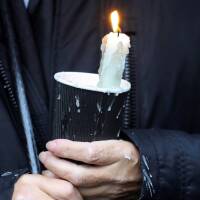Coronavirus Seen Delaying Justice for Iraqi Women Displaced by War
This story was originally published May 11, 2020 by the Thomson Reuters Foundation.
Hundreds of thousands of vulnerable Iraqi women forced to flee their homes during war have still not been able to return and now face even longer delays due to the coronavirus pandemic, researchers warned on Monday.
A study by the Norwegian Refugee Council (NRC) found women were 11% more likely than men to face barriers preventing them from going home after years in camps for those displaced during the conflict with the Islamic State group that began in 2014.
For women, the struggle to prove ownership of their properties is particularly tough because title deeds typically carry the name of the male head of the household, many of whom were killed in the violence.

The closure of courts due to the coronavirus has been a further setback, delaying legal hearings, said Sanne Boswijk, an advisor to the NRC in Iraq.
"It exacerbates the situation of these women in general because access to the court for women in Iraq is difficult to attain in the first place," she told the Thomson Reuters Foundation. "You can imagine if you close the courts for a month the serious backlog we're looking at there."
Iraqi government officials were not immediately available for comment. The country's property laws ensure equal protection for all citizens.
More on the impact of COVID-19 around the world
About 6 million Iraqis — 15% of the population — were forced from their homes during the conflict with the Islamic State between 2014 and 2017, according to United Nations data.
The NRC surveyed about 1,000 women across four conflict-impacted regions of Iraq for its report, and conducted dozens of focus group discussions and in-depth interviews.
Jennifer Abrahamson, head of advocacy and communications at Landesa, a Washington-based land rights advocacy group, said the coronavirus pandemic had exacerbated the difficulties for women in many countries where their rights were not well established.
"Because the social norms and beliefs are discriminatory toward women there are certain gender roles and protection of women's rights in particular cultures that don't always align with the national law," she said. "Women who are affected by war, by conflict, they're displaced, they're trying return home, are facing a number of secondary crises and now you have a pandemic on top of that."
Boswijk said tribal justice mechanisms to establish property ownership were considered more reliable than the courts and were "the socially acceptable route."
Many consider it taboo for women to access tribal leaders on their own without a male relative, making it harder for them to prove their rights, even with documentation.
But Boswijk said the pandemic, which has killed about 110 people and forced Iraq to close mosques, schools and some businesses, provided an opportunity for informal mechanisms to be more inclusive.
"The tribal justice mechanism is dynamic and in that sense there is an opportunity there to broaden the range of protection for women ... to allow them to make that claim on their own," Boswijk said.
Reporting by Ban Barkawi @banbarkawi; Editing by Claire Cozens.


